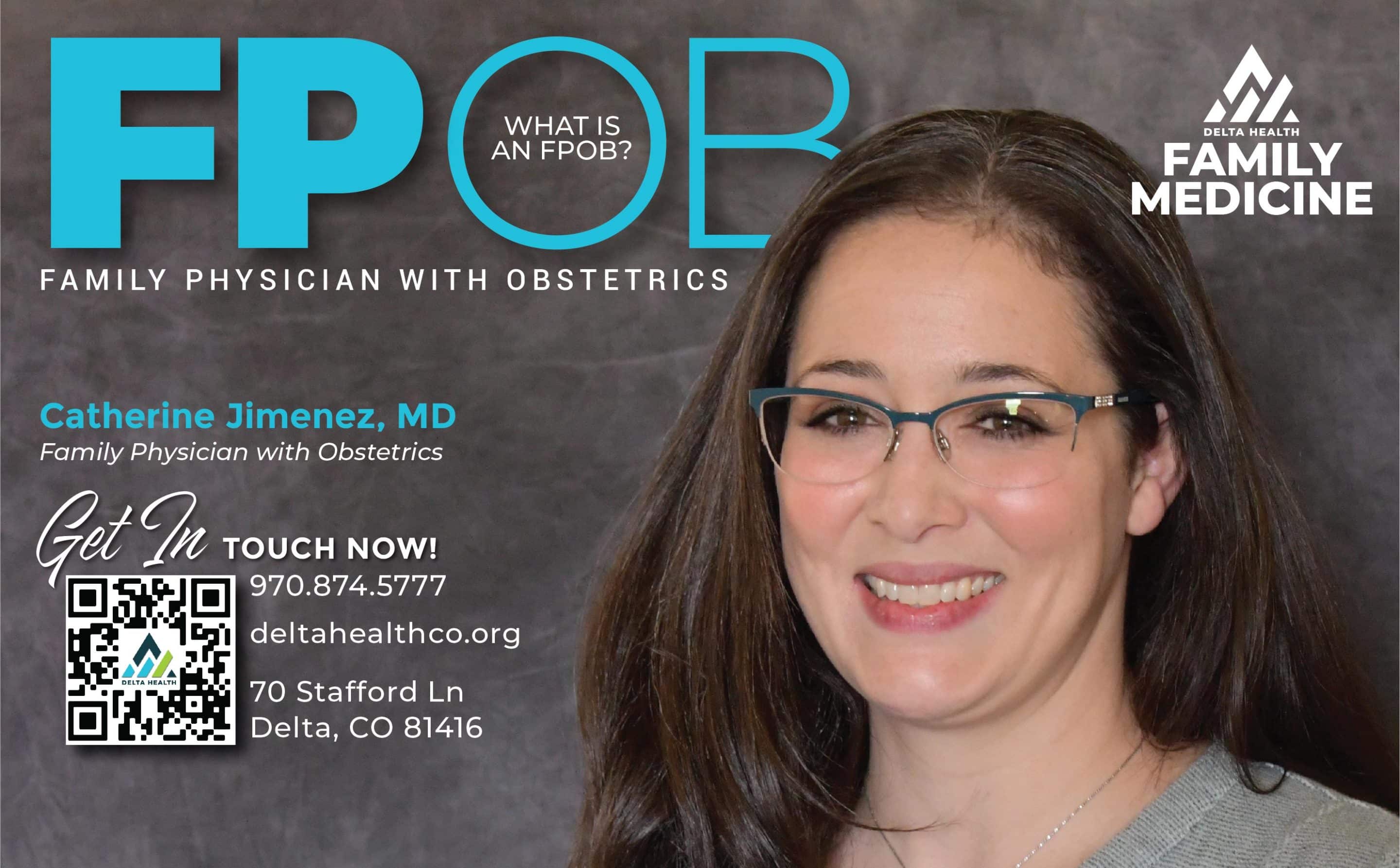By Catherine Jimenez, M.D., Delta Health Family Medicine
As a medical doctor (MD), and family medicine physician at the Delta Health Family Medicine Clinic, you may be interested to know that I have rural Colorado roots. Being born and raised in Trinidad, Colorado and experiencing rural life first hand, I wanted nothing more but to return to Colorado after my medical training to provide a wide scope of care for people in rural areas.
Often your primary care physician’s skills are as unique as the community itself. We take on roles that our communities need and Delta Health uses an integrated care model with six specialized Family Practice Obstetrics Providers (FPOBs) between our primary care clinics.
So, here are a few questions you may be wondering about FPOBs and the integrated care model.
What is a Family Practice Obstetrics Physician?
I have five physician partners throughout the Delta Health system who are also Family Practice Obstetrics Physicians (FPOBs). They are located at the Delta Health Family Medicine and the Delta Health West Elk Hotchkiss clinics. All of us trained at programs where obstetrics including cesarean sections, newborn management, hospital adult and pediatric medicine, and clinic procedures were heavily emphasized.
I enjoy being a family medicine physician who practices obstetrics for several reasons. I get to know my patients and their families before and after pregnancy and have the joy of seeing my patients’ children grow at their well child checkups. I cannot help but address and monitor other chronic health conditions and acute complaints at prenatal visits. One advantage of having your primary care physician manage your pregnancy is that we tend to focus on managing your entire health. We ensure you are up to date on preventative care such as vaccinations, pap smears and assess for routine cancer risk. We also feel very comfortable managing blood pressure, diabetes, and mental health medications during pregnancy. We can manage any acute issue that comes up during pregnancy such as upper respiratory infections and musculoskeletal injuries.
What Can FPOBs Do When It Comes to the Practice of Obstetrics and Women’s Health?
I have many friends from my training who choose to do solely inpatient medicine or emergency room coverage, others who do clinic only, and others like myself who love women’s health and choose to keep obstetrics in our practice.
Family medicine physicians have a wide variety of training and can tailor what they do based on their interests and what their community needs. Many physicians interested in women’s health learn procedures which include birth control implants in the arm or in the uterus. For me personally, I learned to do many gynecologic procedures such as biopsies of the cervix and the uterine lining to look for cancer, dilation and currettage (D&C) for management of pregnancy complications and miscarriage, and excisions of the cervix in the operating room to remove precancerous cells. Instead of prescribing birth control, I pursued extra training as a medical consultant in the field of NaProTechnology and focus on using natural family planning to help patients both avoid and achieve pregnancy naturally and to treat a variety of gynecologic conditions.
Why do some primary care physicians deliver babies and others do not?
A family medicine physician can be many things and provide many services. Several decades ago, primary care doctors did it all: managed clinic visits, delivered babies, and admitted patients to the hospital and even to the intensive care unit. This was the norm for general practitioners. As medicine changed to include specialized training, many roles were delegated to dedicated specialists while family doctors evolved to perform more clinic-based care. This tends to be true in larger cities where there is an abundance of specialists to help care for patients.
However, many towns and especially rural areas do not have many specialists. Family physicians in small towns tend to have a wider scope of care which can include joint injections, hospital adult medicine, hospital pediatric medicine, gynecologic procedures such as cervical and endometrial biopsies, obstetrics including performing cesarean sections, treating hepatitis C, performing endoscopy, covering the emergency room, managing patients in the intensive care unit including patients on ventilators, performing obstetrical ultrasounds, and sports medicine to name a few.
Having FPOBs at Delta Health means that we can adapt to local culture, leading to personalized and sensitive care. As FPOBs, we continue to adjust based on the needs of our communities. Our goal is to build a community of trust, and we do this by having consistent and familiar faces. Over time, this trust leads to improved health outcomes as our patients are more likely to seek care at Delta Health.
For more information on obstetrics and FPOBs at the Delta Health primary care clinics, visit deltahealthco.org/all-services/primary-care-locations/ or call 970.974.7681.


